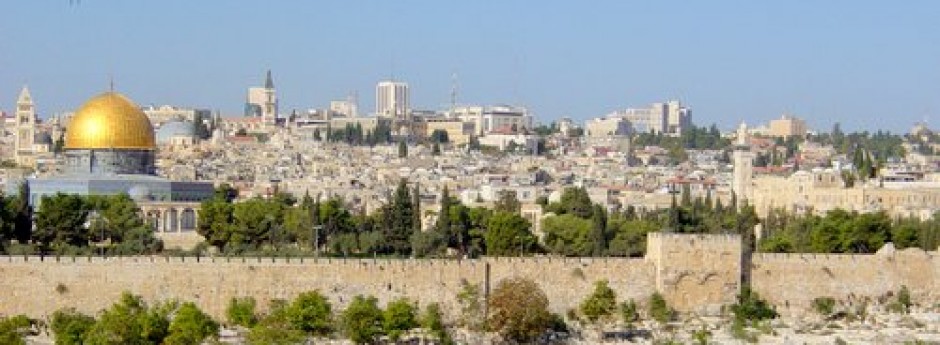-15-
IS GOD A ZIONIST?
In this highly politicized world, many are reluctant even to state their opinions. They are afraid of not being “politically correct” in their beliefs. Lovers of Jerusalem or Zion are sometimes a bit fearful and intimidated to declare themselves “Christian Zionists,” lest they be ridiculed. Yet, when we read the scriptures, we see an astounding thing – God openly and unreservedly declares himself a Zionist. Let us examine this strange relationship that God has with Zion or the city of Jerusalem.
Now we seldom think of God as needing a place to sit and rest, or as needing a footstool for his feet. God is the God of the universe. He merely speaks, and millions of stars and planets come into existence. He is the Lord of the heavens and of the vast reaches of space. Why would he need anything from lowly earth, which is indeed one of the smallest of
his planets?
Yet, it appears from scripture that God has a special relationship with earth. The scripture says that “…The earth is the Lord’s, and everything in it, the world, and all who live in it” (Psa. 24:1). Furthermore, we are told that the Lord has chosen a tiny spot on earth, a small city. To be more specific, he has chosen a 35 acre plot within that small city. We are told that on this tiny plot, God plans to establish his throne forever.
It would seem that if the Creator were actually intent upon establishing such a headquarters upon earth, he would at least have chosen one of earth’s illustrious cities, such as New York, London, or perhaps Paris. Yet, the Bible assures us that God desires Zion more than all of these. This choice makes Zion or Jerusalem unique among all the earth’s cities. The choice also makes God a Zionist.
Let us look at God’s dealings with this city over the long ages of history.
JERUSALEM’S ANTIQUITY AND CENTRALITY

The Medaba Map from Byzantine times showing Holy Jerusalem
Jerusalem is one of earth’s oldest cities. But God’s choice of Jerusalem was undoubtedly made even before time began. The scriptures tell us that God chose us believers before time (Eph. 1:4). In order for God’s eternal plan to have completeness and continuity, he must have also chosen Zion before time, since Zion is a central focus of our faith pilgrimage (Heb. 12:22).
Indeed, to understand the beginnings of Jerusalem, we must probe into the dim beginnings of history. Several Jewish and Christian traditions shed some light on Jerusalem’s ancient beginnings. The great Jewish philosopher and physician, Maimonides, had this to say about the city:
By a universal tradition, we know that the Temple which David and Solomon built stood on the site of Araunah’s threshing floor; and that is the place where Abraham had built an altar to sacrifice his son Isaac; and that is where Noah built an altar when he emerged from his ark; and that Cain and Abel offered sacrifices on the altar there, and that Adam offered a sacrifice there when he was created, and that indeed, it was from that spot that he was created… 1
Early Christians accepted Jerusalem as the physical and spiritual center of the earth. Even early maps of the world show Jerusalem as the center.2 At Jerusalem’s Church of the Holy Sepulcher there is actually a place that marks the center of the world. Early Christians also assumed that Jerusalem was the place where Adam was both created
and buried.
Moslem tradition, which builds upon earlier Jewish and Christian traditions, also accepted Jerusalem as the center of the world and the place of creation. Moslems still believe that underneath the Dome of the Rock on the Temple Mount, one can hear the roar of the five rivers of Eden. 3
ITS HISTORICAL SIGNIFICANCE
Let us look very briefly at the history of Jerusalem in biblical times. In the early chapters of Genesis we encounter Jerusalem, although we yet do not know her by that name. In the fourteenth chapter of Genesis we are introduced to the city of Salem and to the mysterious king of this city. We know from the Bible, that Salem was the name given to Jerusalem in ancient times.
Melchizedek, the king of Salem, went out to meet Abraham as the latter returned from his miraculous defeat of the Babylonian armies. Salem was at that time the name of the ancient city just below Mt. Moriah. It was that ancient city which would later became David’s Jerusalem.
Melchizedek was the king of this small city. It is interesting that in the Hebrew language, Melchizedek means “king of righteousness.” He was also king of Salem, which is interpreted as “king of peace.” In a day when everyone had a genealogy, it is strange indeed that this man did not have one (Heb. 7:2-3). Abraham must have thought it strange too, for he gave Melchizedek a tithe of all his spoils of war.
In Psalm 110, David develops this interesting encounter between Abraham and Melchizedek. Under God’s inspiration, he relates the story to God’s coming Messiah. He states that the Messiah would be both king and priest; that he would be King of Righteousness and King of Peace; without beginning of days or end of years. The coming Messiah would therefore be “in the order of Melchizedek” (Psa. 110:4).
Many years after the Melchizedek experience, a young lad by the name of Jacob stumbled wearily along his journey. He stopped a few miles north of the present Temple Mount (but easily within the sacred portion described in Ezekiel 48:9-10). As he laid his head upon a rock and went to sleep, he had a vision of a ladder that reached to heaven. The lad awoke in fear and trembling and exclaimed, “…How awesome is this place! This is none other than the house of God; this is the gate of heaven” (Gen. 28:17).
Finally, centuries later, as Moses led the children of Israel out of Egyptian bondage, and as they miraculously crossed the Red Sea, Moses and the Israelites sang these words: ”
You will bring them in and plant them on the mountain of your inheritance— the place, O LORD, you made for your dwelling, the sanctuary, O Lord, your hands established (Ex. 15:17).
Moses was speaking here of Jerusalem, but it was Jerusalem before she was actually named in scripture.
As the Children of Israel entered the land of Canaan they were soon attacked by Adoni-Zedek the king of Jerusalem (Josh. 10:1-4). This is the first mention of Jerusalem by name in the Bible. The name seems to be a compound word utilizing the earlier “Salem.” Jerusalem thus may mean “possession of peace.” Joshua and the Israelites were victorious over the Jebusites of Jerusalem, however it seems that they did not conquer the walled portion of the city, or Jebus as it was then called.
Centuries later, young David must have realized the great redemptive importance of Jerusalem. Perhaps he often gazed at the city as he herded sheep in nearby Bethlehem. Many of his Psalms speak of Jerusalem or Zion and her significance to mankind.
The final conquest of the city would be left to David and his men some years later. After his conquest it was named “the City of David” (2 Sam. 5:9), not to be confused with Bethlehem which is called this in Luke 2:11. Still today the most ancient portion of Jerusalem is called by this name.

Recent City of David excavations
The area of David’s city can be seen today immediately below the
Temple Mount and on the left edge of the Kidron Valley.
JERUSALEM’S UNIQUENESS
Jerusalem is unique among all the world’s cities for several reasons. Naturally speaking, it is constantly in the limelight of world attention. Jerusalem is probably on the lips of the world’s newscasters more than any other place on earth.
Jerusalem is the center of literary attention with an estimated 50,000 to 60,000 books already written about her..4 Jerusalem’s famous sights have probably also been photographed more than most other sites.
The real uniqueness of Jerusalem lies in the fact that it is the city of God. It is indeed the only city on earth specifically chosen by God. God did not choose New York or London or Paris. He chose the tiny mountain town of Jerusalem. The scriptures tell us some amazing things about this choice. In Psalm 132:14, God says of Jerusalem, “This is my resting place for ever and ever; here I will sit enthroned, for I have desired it–“ The scripture makes it very plain that God dwells in Jerusalem or Zion (Psa. 9:11; 135:21).
The choice of Jerusalem is highlighted several other places in scripture, such as 1 Kings 11:32, 1 Kings 14:21, and 2 Chronicles 7:12. In Psalm 68:16, the Psalmist speaks of the mountains of present day Jordan as looking with envy upon Mt. Zion because of its unique relationship with the Creator. We are told further in scripture that God’s rule will someday be fully established in Jerusalem:
At that time they will call Jerusalem The Throne of the LORD, and all nations will gather in Jerusalem to honor the name of the LORD. No longer will they follow the stubbornness of their evil hearts… (Jer. 3:17).
In Ezekiel 43:7, God says of Jerusalem:
…this is the place of my throne and the place for the soles of my feet. This is where I will live among the Israelites forever…
Now back to the matter we mentioned earlier of God needing a place of rest and a place for his footstool. It is clear in scripture that Jerusalem is that place of rest and that footstool. It is given this title several places in scripture. For instance, in Psalm 99:5, the Bible says, “Exalt the LORD our God and worship at his footstool; he is holy.”
In 1 Chronicles 28:2, it is clear that David felt he was building a place for God’s footstool when he planned the building of the Temple. He says:
…Listen to me, my brothers and my people. I had it in my heart to build a house as a place of rest for the ark of the covenant of the LORD, for the footstool of our God, and I made plans to build it.
As we see from these scriptures, Jerusalem and her Temple are considered as the very house of God. This is not only reflected in the Old Testament in places like 1 Chronicles 22:7, and Daniel 5:3, but it is also reflected in the New Testament. In Luke 2:49, Jesus refers to the Temple built by Herod as his “Father’s house”
In his holy Word, God shares other things with us — things that make Jerusalem unique on earth. We learn that God is very jealous over Jerusalem. He says in Zechariah 1:14, “…I am very jealous for Jerusalem and Zion.”
Imagine that! The God of the whole universe is actually burning with jealousy over one tiny city on earth –over Jerusalem. Woe to those people and nations who carelessly touch this city.
In Isaiah 49:16, God himself speaks through the prophet saying, “See, I have engraved you on the palms of my hands; your walls are ever before me.” What a unique relationship this tiny city has with the Creator! We read further in scripture that God has put his name in Jerusalem (1 Kings 9:3); and that his presence is there. In fact, there will be a day coming in the future when Jerusalem will have a new name — “…And the name of the city from that time on will be: THE LORD IS THERE.” (Ezek. 48:35).
Jerusalem is like an umbilical cord between heaven and earth. It is God’s base of operations, his earthly headquarters. However, perhaps the most unique thing about Jerusalem is its eternal quality. Jerusalem has been called, and not un-rightly so, “the eternal city.” In Joel 3:20 the prophet says, “Judah will be inhabited forever and Jerusalem through all generations.” In Jeremiah 17:25 the prophet is more specific when he says, “…and this city will be inhabited forever.”
The Bible says that God dwells in Jerusalem forever (Psa.132:14). God has seen fit to put his name in Jerusalem. We see in 1 Kings 14:21 that Jerusalem is “…the city the LORD had chosen out of all the tribes of Israel in which to put his Name…”Jerusalem is God’s holy mountain (Zech. 8:3).
GOD’S BASE OF WORLD REDEMPTION
Neither the Jewish people nor Jerusalem were chosen simply because God likes to play favorites. They were both chosen for God’s world-wide redemptive purposes; that the revelation of God could be delivered and kept intact. They were chosen that the final plan of redemption would be completed, and that the good news of God could go out to all earth’s distant lands.
In Psalm 87:1, we are told that God has set his foundation in Jerusalem. This city is the eternal foundation for all of God’s redemptive work on earth. Compare this verse with Psalm 11:3, in which the Bible says, “When the foundations are being destroyed, what can the righteous do?”
To put it in modern terms, God had to build an infrastructure of salvation. The building of this infrastructure has taken thousands of years. Think how necessary this infrastructure is. What if God had simply gone out into the pagan world and said, “Hello, I am the Savior!” After their initial shock, the backward tribesmen would have probably responded, “OK, but what is a Savior?” God had to draw us many pictures and give us the types and patterns so that we could grasp these invisible truths and concepts.
God established Israel so that we could understand the concept of Holy Nation. He established Jerusalem and Zion so that we could visualize the Holy City and New Jerusalem. For centuries the Temple stood and rivers of blood flowed into the Kidron Valley. All this pictures for us what sin is about and what sacrifice means. From the Temple we can understand what it means to be a priest of God, or temples of God, and what it means to be holy and separate. There are a thousand other things that God had to picture for us in his infrastructure of salvation.
Now obviously, pagan lands were desperate for God’s redemption. In every place altars were being built as man searched vainly for the true God. Man in his ignorance and his lost condition was attempting to provide the necessary sacrifice. That could never do. However, once God’s salvation infrastructure was fully in place, emissaries from Zion could go to the whole world with the good news that there is a God, that the sacrifice has been made and that his great salvation is available to all.
A PLACE OF OFFERING
Reconstruction of a biblical altar at Tel Sheva
It is often necessary to remind Christians living in Jerusalem about one important facet of her existence and purpose. Jerusalem is a place of sacrifice. Many people living in Jerusalem even in modern times have realized this uncomfortable fact as they have offered up various aspects of their lives to God. It is encouraging today that more and more tour groups visiting Israel are bringing gifts and offerings to new immigrants and to the many others in need.
Long ago, Father Abraham was called of God to take his precious, only son and offer him to God as a burnt offering. Abraham obeyed, taking his son and journeying many miles as God had instructed him to Mount Moriah (pronounced Mor-ee-ah). As Abraham was about to make that awful sacrifice, even as the knife was drawn, God’s angel called out for him to stop. There in the thicket, Abraham saw that a ram was caught by its horns. Abraham then offered the ram instead of his son. He must certainly have realized that the lamb would someday be the substitutionary atonement in the place of mankind.
Surely Father Abraham had a great vision of redemption that day. He must have realized the connection between beloved son and lamb. Later God would give his only beloved Son as the true Lamb for the sins of the world. It is interesting that Abraham gave a name to that place. It was called Jehovah Yireh, and it means that the Lord will provide. He will provide the Lamb. This incredible fact stands at the center of world history, that almost two thousand years ago God sacrificed his beloved Son as the Lamb for the sins of mankind.
Is it possible that Abraham really saw the Messiah at this time? In John 8:56, we read these words of Christ himself, “Your father Abraham rejoiced at the thought of seeing my day; he saw it and was glad.” As we have mentioned before, the place of that sacrifice, according to long-standing Jewish tradition, was none other than Mount Moriah, or the present Temple Mount in Jerusalem. It was the same area where Messiah would later be sacrificed on a cross for the sins of all humankind.
Many years after David and his men had conquered the city he sinned against God by numbering Israel. Because of his sin, a great plague engulfed the city (2 Sam. 24:18-25). The angel of the Lord was standing near what later came to be known as the Temple Mount. He had already drawn his sword and was ready to bring disaster upon Jerusalem.
In order to stay the plague, David was instructed to go to the site and make an offering to God. When he approached the place, he immediately purchased the area from Arunah the Jebusite. There he built an altar and made sacrifice. The plague was stayed and Jerusalem was spared. The plague of sin upon all mankind would later be stayed by the offering up of Jesus in this same area.
After David’s death, his son Solomon built the Temple on Mount Moriah. God made this promise to Solomon: “…I have consecrated this temple, which you have built, by putting my Name there forever. My eyes and my heart will always be there.” (1 Ki. 9:3). To emphasize God’s acceptance of his Holy Hill as a place in which he would meet all nations, we read in 2 Chronicles 5:14 that “..the glory of the LORD filled the temple of God.”
In Israel’s long history there was not serious question as to where offerings were to be made. They had to be made in Jerusalem as the scripture commanded. In Deuteronomy 12:13-14 we read,
Be careful not to sacrifice your burnt offerings anywhere you please. Offer them only at the place the LORD will choose in one of your tribes, and there observe everything I command you.
The Temple as it appeared in Jesus’ time, as represented in the Ancient Model City
According to God’s word it was necessary for Israelite males to appear before the Lord three times each year in Jerusalem to bring their offerings. These appearances had to coincide with the pilgrimage festivals of Passover, Pentecost, and Tabernacles
(Exo. 23:14-17).
Now as we look back over the hundreds and thousands of years of God’s redemptive program we can readily see why offerings could not be made outside of Jerusalem. It was in God’s plan all the time that the Messiah would offer himself as a Lamb without blemish for the sins of the whole world in that very place.
During the great festival times there were thousands and thousands of animals sacrificed in Jerusalem. In addition there were thousands of gallons or liters of wine poured forth as a libation to the true God.
All these things were but pictures of the real sacrifice that would take away sins forever. The blood of bulls and goats could not take away sin (Heb. 10:4). The very fact that these sacrifices had to be repeated year after year testified to their inability to deal adequately with the sin problem (Heb. 10:2). The author of Hebrews tells us that they were merely shadows of the redemption that was to come.
When time had reached its fullness, the Messiah came to earth as predicted by Israel’s prophets and began his short earthly ministry. At the end of his spectacular ministry, he knew that he must go to Jerusalem, although his disciples tried hard to dissuade him. Jesus proclaimed in Luke 13:33, “…surely no prophet can die outside Jerusalem!”
He was the fulfillment of all God’s promises as to the redemption of humankind. Jesus came as a talking Lamb, as was spoken of him in the Old Testament in Psalms 40:6-8:
Sacrifice and offering you did not desire, but my ears you have pierced ; burnt offerings and sin offerings you did not require. Then I said, “Here I am, I have come-it is written about me in the scroll. I desire to do your will, O my God; your law is within my heart.”
Isaiah spoke even more graphically of him in these words:
He was oppressed and afflicted, yet he did not open his mouth; he was led like a lamb to the slaughter, and as a sheep before her shearers is silent, so he did not open his mouth. By oppression and judgment he was taken away. And who can speak of his descendants? For he was cut off from the land of the living; for the transgression of my people he was
stricken (Isa. 53:7-8).
THE HUB OF EARLY CHRISTIANITY

The Mount of Olives where Jesus prayed and later ascended to Heaven
After the death, resurrection and ascension of Jesus, Jerusalem became the hub of the early Church. Indeed this was assumed in the last command Jesus made to his disciples before his ascension. He said in Acts 1:8:
But you will receive power when the Holy Spirit comes on you; and you will be my witnesses in Jerusalem, and in all Judea and Samaria, and to the ends of the earth.
It is clear from these words that Jerusalem was to be the starting point for the expansion of the early church.
This concept was certainly in line with Old Testament prophecies. In Psalm 14:7 we read, “Oh, that salvation for Israel would come out of Zion!…” In Isaiah 46:13 we read, “…I will grant salvation to Zion, my splendor to Israel.”
Our Christian faith has the words “Made in Jerusalem” stamped all over it. The Church has often tried to disguise this fact however. Everything we hold dear came from Jerusalem. In Psalm 87:7 the Bible writer says of Jerusalem, sing, “…All my fountains are in you.” From Jerusalem we have our Bible, our Messiah and our redemption. That redemption was purchased for us on a tiny hill within the present walls of Jerusalem’s Old City.
Once our redemption was completed, the early Church was then formed in Jerusalem. The Upper Room where the disciples gathered was there. The setting for Pentecost was there. It is likely that the thousands of new converts were baptized in some of the many mikvaot that have been found in the southern wall area of the Temple. Stephen, the first martyr died in Jerusalem, and even today one of the eastern gates is named for him.
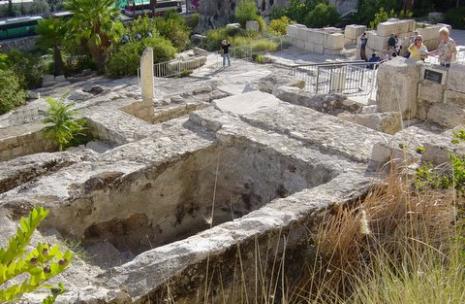
Mikvaot near the southern steps of the Temple Mount. Many scholars feel that these
were undoubtedly used as the baptismal pools by the early Christians on the Day of Pentecost
No doubt the most important thing about Jerusalem is that the Messiah will return to her. Today many gentile nations claim the Messiah as their own. However, he will not return to any one of these nations. He will return only to Jerusalem as Zechariah 14:4 declares: “On that day his feet will stand on the Mount of Olives, east of Jerusalem…”
The scripture makes it very clear that the Messiah will then rule from Jerusalem and his rule will extend throughout the whole world. Psalms 2:6-9 declares:
I have installed my King on Zion, my holy hill. I will proclaim the decree of the LORD: He said to me, “You are my Son ; today I have become your Father. Ask of me, and I will make the nations your inheritance, the ends of the earth your possession. You will rule them with an iron scepter ; you will dash them to pieces like pottery.”
Today we may think Jerusalem is the center of world attention. However, we have not seen anything yet. When the Messiah returns to Jerusalem we are assured that “…every eye will see him, even those who pierced him; and all the peoples of the earth will mourn because of him. So shall it be! Amen.” (Rev. 1:7).
PRAYER FOR ZION
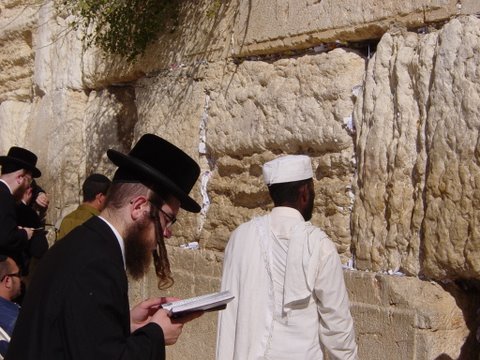
Orthodox Jews praying at the Western Wall
Now that we glimpse something of the importance and critical nature of Jerusalem in God’s plan, we can understand why Jerusalem needs our prayer. This fact applies both to the Jewish people and to Christians.
In Psalm 122:6, we are instructed with these words: “Pray for the peace of Jerusalem: ‘May those who love you be secure.’” Praying for Jerusalem means praying for her well-being, her unity, her completeness, her physical peace, her defense, along with numerous other things. In the following verses we see that we are to pray for her walls and palaces (v.7). Of course we should pray for her Temple, that in God’s good time it should
be rebuilt (v.9).
We are to pray for the Jewish people who have returned to Jerusalem. They are a part of God’s great plan of redemption that will ultimately reach the whole earth. We are to pray for our brethren and companions (v.8). This may well include those hundreds of Christian brothers and sisters who now make Jerusalem their home. Sometimes the spiritual pressure upon these lives becomes almost unbearable. Pray for their peace and well-being.
The Devil has long realized the importance of Jerusalem in God’s plan. Remember, he also reads the Bible. For this reason he has attacked Jerusalem with all his might, and especially in this day when God’s people are returning back home. We need to pray against all the current plans to divide Jerusalem or to turn the city over to unbelievers.
We should learn to take Psalm 137:5-6 seriously. It says:
If I forget you, O Jerusalem, may my right hand forget its skill. May my tongue cling to the roof of my mouth if I do not remember you, if I do not consider Jerusalem my highest joy.
Then there is that amazing verse found in Isaiah 62:6-7. It reads:
I have posted watchmen on your walls, O Jerusalem; they will never be silent day or night. You who call on the LORD, give yourselves no rest, and give him no rest till he establishes Jerusalem and makes her the praise of the earth.
This seems to be the only verse in the Bible where we are authorized and encouraged to “bug God” about something. Here we are literally told to give God no rest until he establishes Jerusalem and makes it a praise in the earth. It is something close to
God’s heart.
Yes, God is a Zionist. Zion is critically important to his program. He loves Zion. He loves Jerusalem, and he wants his people to do the same. Pray for the peace of Jerusalem!
STUDY QUESTIONS:
Give one reason why the expressions “Zion” or “Zionism” may not sound “politically correct” today.
Why does it seem odd that God would choose Zion as his eternal resting place?
Why would God need a base for his program of world redemption?
Give two reasons why we should pray for Jerusalem.
NOTES
1. Quoted in, Eliyahu Tal, Whose Jerusalem? (Jerusalem & Tel Aviv: The International Forum For A United Jerusalem, 1994) p. 17.
2. Tal, Whose Jerusalem? p. 16.
3. Israel Tour Guide (Englewood, NJ: SBS Publishing) p. 256.
4. Tal, Whose Jerusalem? p. 11.
